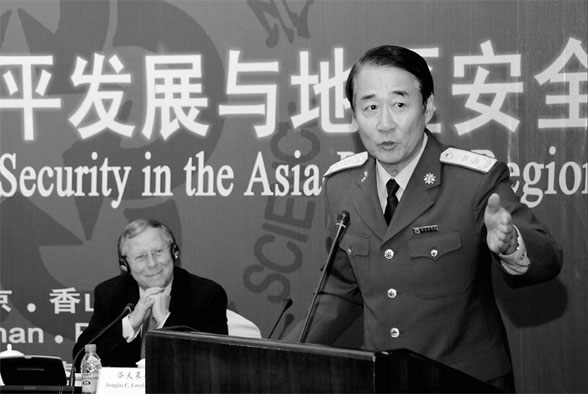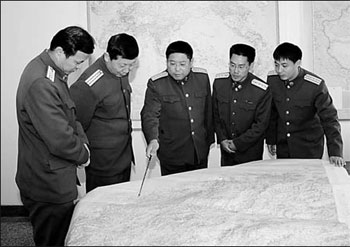Martial arts for information age
|
Lieutenant General Liu Yuan, political commissar of the AMS, presenting at the first International Forum of China Association for Military Science, in Beijing 2006. |
An academy lying in the foothills of west Beijing may not catch the eyes of passers-by, but it is a must-visit for many countries' military leaders, including United States former secretary of defense Donald Rumsfeld and chief of the US Pacific command Timothy Keating.
The Academy of Military Science (AMS) of the People's Liberation Army (PLA) was founded with the endorsement of former chairman Mao Zedong 50 years ago.
The idea of founding the AMS dates back to autumn 1956, when the PLA was searching for a systematic theoretical direction after a period of war.
"Mao realized there was a problem with China not having its own military codes, or laws, during wartime. We copied everything from the former Soviet Union and it no longer fitted the liberated China," senior colonel Yang Zhiyuan of the AMS says. "So he raised the issue of gathering a number of experienced veteran military leaders."
Marshal Ye Jianying, one of China's top 10 generals, became the academy's first president.
Looking forward to its 50th anniversary, the academy has become a top military think tank for the country's military. It is also a platform for communication between Chinese and foreign forces.
"As PLA's major research center, we provide consulting services for the Central Military Commission (CMC)," a colonel surnamed Bao says. "The AMS' advice was significant to China's military strategies in a different historical era."
Bao's words are reflected by the changing of China's military strategy from the 1960's "active defense and luring the foe deep into the country", to just "active defense" in 1980.
AMS' then president general Song Shilun initiated the change because "luring the foe deep into the country" was a tactical issue but not a strategic-level one, Bao says.
Today's AMS also has a consultancy role. Senior colonel Chen Zhou of the academy has participated in the drafting of China's National Defense whitepapers since 1997 and is now the leader of the white paper's drafting panel.
But the AMS is also a key research center in academic military science. Its academic research ranges from classical Chinese military thought - Sun Tzu's Art of War, for example - to contemporary military theories and international military classics.
It has finished nearly 3,300 research projects in the past 50 years, including publishing China's first military encyclopedia in September 1997.
"The 1997 military encyclopedia is a milestone for the development of China's military science because it ended the history of no such works here," says senior colonel Cao Xiaosheng, adding the academy is editing a second edition, that is expected to be published in late 2009.
"(The second edition) will be an enormous collection of China's military culture," he added.
In the foreign academic military domain, the AMS has also translated a number of international military classics and works including Prussian strategist and militarist Carl von Clausewitz's On War.
Military diplomacy has become an important component of China's diplomacy. Many foreign delegations and military high-rankings visit the place because of its role as a top consultant in China's military strategy.
"As the world is concerned about China's increasing military strength and strategic intentions the AMS is telling the world that China doesn't want hegemony and the Chinese army is a peace-preserving force," lieutenant colonel Zhu Yuxing says.
"A key goal of our job is transmitting our traditional strategic thought that 'peace is most valuable' to the world," he added.
The academy has held a series of academic military events and forums to fulfill this goal. It has held seven international symposiums on Sun Tzu's Art of War and the eighth one is expected to be held later this year.
A fresh dialogue entitled "Military Modernization and Regional Mutual Trust" between high-level defense scholars from China and the ASEAN countries also started yesterday.
While more foreign visitors are coming here, the AMS is also actively seeking its international colleagues abroad to spread China's military thought.
Its researchers have visited more than 40 counties since 1986 and some of them have become visiting scholars at foreign academic institutes and universities.
The academy also aims to build more stable communication channels with other countries' top military think tanks, such as the international Institute for Strategic Studies in London and the Rand Corporation of the United States.
"We need to better understand the general tendency of military progress in the world when it is getting smaller," Zhu says. "Knowing what others are doing and especially what experience we can borrow from them are key jobs for the AMS in foreign affairs."
|
The Academy of Military Science's sharpest minds inspecting a map. |
The AMS' work has also won attention from the nation's top leaders since it was founded.
Both Deng Xiaoping and Jiang Zemin visited the academy to celebrate its 20th and 40th anniversaries. President Hu Jintao visited in December 2006, before China National Defense was published later that month.
Chinese military think tanks impress foreign diplomats in Beijing because of the academic rigor with which they introduce their thoughts and ideologies across the world.
"The discussion (with Chinese think tanks) is always objective analysis, independent of stereotype and media bias. It is an in-depth analysis which clearly shows that these academics have the capability of looking at the genesis of problems and coming up with original solutions," says Captain Foad Baig, a naval attach at the Pakistani embassy in Beijing.
"When you go and meet them and read their credentials, you will feel they have so much experience."
Baig said he was also impressed by the friendly attitude of the think tank's personnel.
"They treat their audience members as friends," Baig says.
Today's AMS has turned its eyes on the transformation of Chinese army in the information age.
"Informationization is the direction of Chinese military development and our armies will experience more changes and innovation," Bao says. "This is a wisdom-laden process and also what the AMS will focus on in the future."
(China Daily 03/12/2008 page20)
















